Samsung Galaxy Nexus & Ice Cream Sandwich Review
by Brian Klug & Anand Lal Shimpi on January 18, 2012 1:34 PM ESTBattery life remains the other big axis on which smartphones are judged, and here we've turned to our regular 2011 suite of battery life tests to see how the Galaxy Nexus shakes out. Our battery life testing consists of a page loading suite which loads through a few dozen pages endlessly on both WiFi and cellular data until the phone dies, with the display set at 200 nits. For the cellular tests, we're always careful to test in cellular environments with decent signal (at least -75 dBm or higher) as well, since that's a factor. Next is a simple call test where we play music at both ends of a call until the device under test dies, and our final test is a WiFi hotspot workload which consists of four page loading tabs and a 128 kbps streaming MP3 station that runs until the phone dies.
First up are the web browsing tests over cellular 3G; this means EVDO Rev.A for the CDMA/LTE version, and WCDMA T-Mobile for the GSM/UMTS device.
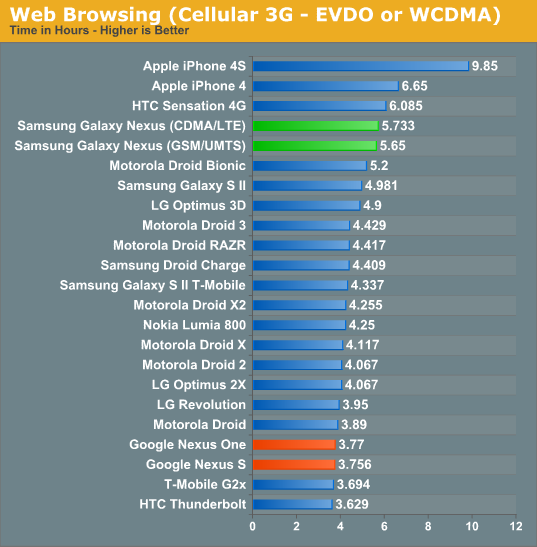
The Galaxy Nexii both do surprisingly well. I'm actually very impressed with how long the devices lasted subjectively on 3G and this definitely backs that up. Of course, both devices include beefy batteries, but Samsung has done a nice job thus far including big batteries without making devices bulky or heavy.
Next up is the same test, but on 4G LTE for the CDMA/LTE variant.
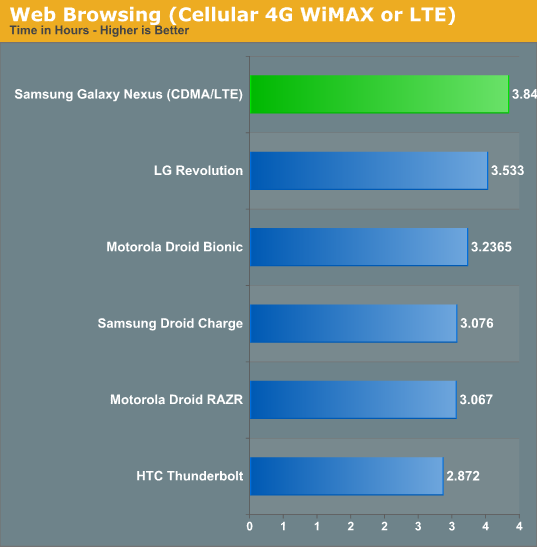
The Galaxy Nexus doesn't post numbers very far in front, but manages to come in the top of the pack on 4G LTE at just under 4 hours. This is a pretty impressive result, honestly, considering that CMC221 is likely made on the same 45nm manufacturing process as CMC220. Again, I'm impressed with the Galaxy Nexus' longevity even on 4G LTE.
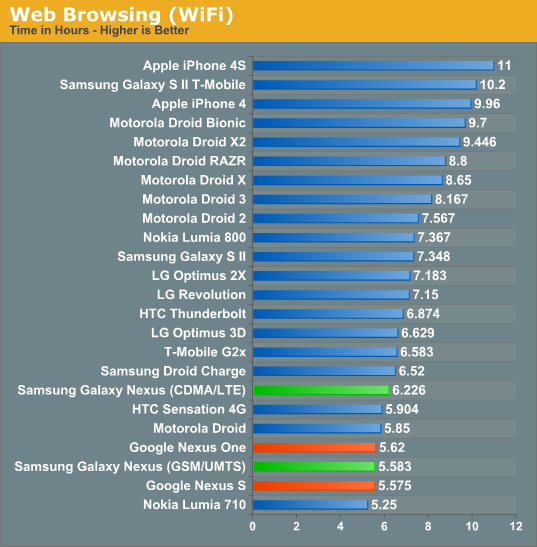
Surprisingly, the Galaxy Nexus can't break past that 6 hour mark even on WiFi, however, which does lead me to think we might be constrained by driving that display.
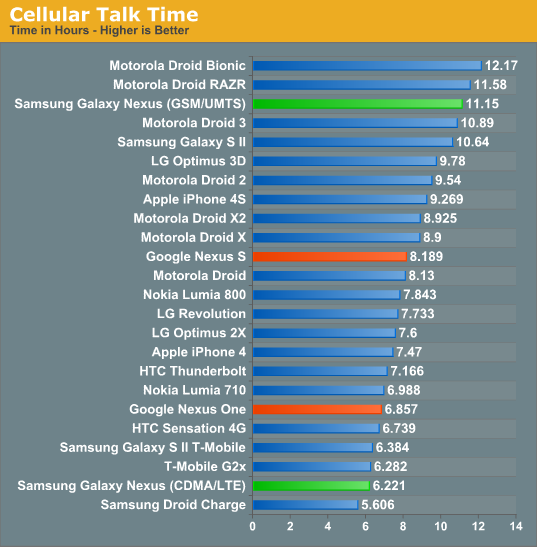
If you ever wanted to see how much difference having a different cellular architecture makes, see above. The GSM/UMTS Galaxy Nexus lasts impressively long on a voice call, at over 11 hours, yet its CDMA/LTE brother lasts just over half that.
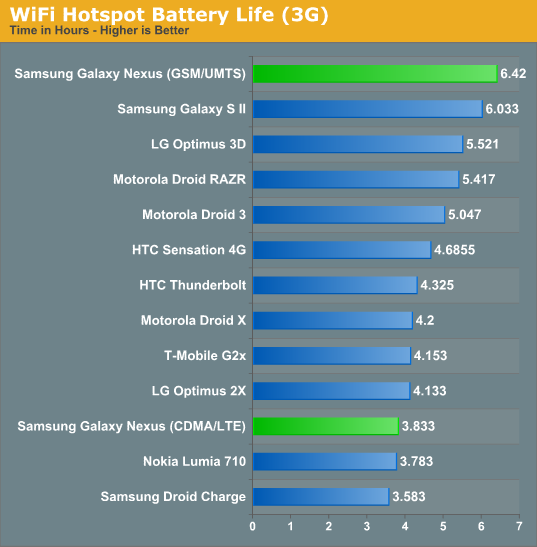
WiFi hotspot on 3G tells the same story - I'm not sure what Via Telecom's CBP7.1 draws in its active state for EVDO or 1x voice, but it seems to eat up more power than the XMM 6260 (X-Gold 626) in the GSM/UMTS Galaxy Nexus.
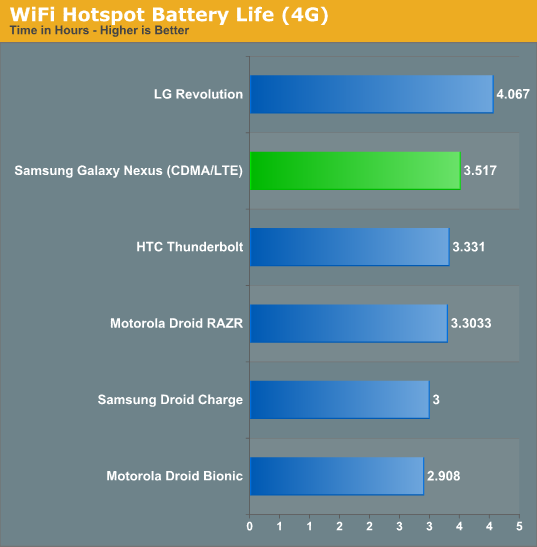
As a 4G LTE WiFi hotspot, the Galaxy Nexus loses its edge over the Revolution, but does come in just ahead of the rest of the 4G LTE herd.
The story of battery life on the Galaxy Nexus unsurprisingly depends on which variant you're talking about. For a phone with a 4.65" display, I'd say I'm impressed with the battery life on both devices - remember that the area that needs to get lit up goes as r^2 - increasing that and not killing the battery is a big feat. In addition, I'd wager that using the OpenGL ES renderpath (and accelerated browser in 4.0) definitely helped both Galaxy Nexus devices post impressive scores. As for the two variants, the GSM/UMTS device has impressively long battery life pretty much across the board. Playing with that phone, I was rarely wanting for more on my regular use schedule (I charge at night on my nightstand). We've seen XMM6260 before in numerous devices where it seems to be a pretty good citizen.
The CDMA/LTE variant, on the other hand, depends strongly on what air interface you end up using most - on 4G LTE the device comes in at the front of the pack usually, and its 3G web browsing test is above average. However, if you make a lot of voice calls, the phone might not cut it. Unsurprisingly the CDMA/LTE Galaxy Nexus does nothing to dramatically change 4G LTE battery life - for that we're still waiting for upcoming 28nm LTE basebands.










185 Comments
View All Comments
CoryS - Thursday, January 19, 2012 - link
Guys, this is a NEXUS it is a dev device. That primary reason I got it was because of this...better hardware will be right around the corner...but we won't see another Nexus..especially on Verizon for some time.It is refreshing to have a community to fix issues OEMS ignore (yes even Apple) for a change. This is my first unlocked device, and i can't see myself ever going back to anything else.
medi01 - Friday, January 20, 2012 - link
Wake up, Smartphone market (worldwide):1. Samsung 24%
2. Apple 18%
Android vs Apple = 3 vs 1 and gap is raising.
Most people turn to apple due to FUD, like this article. Google "steppit out of the shade of its competitor" having three times Apple's market share and much more usable interface (try to quickly access settings like wlan/bluetooth/gps on ios)
steven75 - Friday, February 10, 2012 - link
LOL dont you get it? You don't *need* to fiddle with those settings on iOS necause the battery life is so dramatically better.Also, funny reading this comment after Apple's Q4 report where they dominated.
Omid.M - Wednesday, January 18, 2012 - link
I hope Samsung puts out this phone based on GN aesthetics but Exynos 5250 (plus MDM9xxx multi-mode/LTE modem) and blows away the competition.@moids
Chumster - Wednesday, January 18, 2012 - link
Could someone clarify on what GPU/CPU he was talking about coming in Q2 devices? Cray? Crate? It was hard to pick up on my headphones.mmp121 - Wednesday, January 18, 2012 - link
KraitRead below:
http://www.anandtech.com/show/4170/qualcomms-annou...
Enjoy!
Conficio - Wednesday, January 18, 2012 - link
Really, Google can't survive once Walled Garden platforms like iOS gain traction.While it is nice to control the OS (Chrome OS) on PC like devices and nice to stick it to Microsoft, it is essential in the world of smart phones. Google clearly saw that Apple did the unthinkable, wrestle control of the phone's apps away from the networks. That is an existential thread for Google. If there is a billion PC users world wide, there is a multitude of smart phone users, sooner or later.
If a hardware manufacturer and OS provider like Apple (or Microsoft) controls the apps that can be provided to the phone and features, move from browser to apps on phones, then this is the end of (a profitable) google sooner or later.
From anther point of view, Google is a huge data center that provides you with data services on their computing power (and you pay for it with advertisement somehow). Apple is a hardware manufacturer that sees it necessary to control the software to deliver a good user experience. Sure, two different approaches to a smart phone OS.
hackbod - Tuesday, January 24, 2012 - link
"Google clearly saw that Apple did the unthinkable, wrestle control of the phone's apps away from the networks."There is this weird thing I see expressed a lot, as if Android is a reaction to the iPhone.
It is not.
In this particular case, it is obvious: Android's SDK was made available a few months after the original iPhone was on sale, well before there was *any* native SDK for the iPhone. At that time Apple's very clear official policy was that web-based apps was the One True Way to create applications for their phone. There was no concept of an App Store, no phone apps except what Apple shipped built in to the iPhone, nothing wrestled away from the networks in that department.
If Android was a reaction to anything, it was to the current situation on desktop PCs, with one company controlling that platform, and being able to quite strongly dictate and control its ecosystem and thus large parts of the computer industry.
One of the goals of Android was to try to keep that from happening in the upcoming mobile industry, by creating an open platform so that everybody in the industry can compete as equally as possible.
(And an aside -- this also makes it funny to see the recent stuff going around about Google "losing control" of Android. Android was very much set up so that no one company, not even Google, could have anything like the control that Microsoft does over Windows. This should be pretty obvious to anyone who wants to actually write thoughtful articles on the topic and not just link bait.)
bjacobson - Wednesday, January 18, 2012 - link
Can you talk more about this? From Diane Hackborne's post here (https://plus.google.com/u/0/105051985738280261832/... it sounds like the "limitation" is memory bandwidth in that hardwares that are "laggy" are laggy because they can't render to the entire screen 2 and 3x per frame for all the overlays. Which wouldn't seem like so much of a Tegra2 limitation in my opinion considering it has the power to play games like Quake 3 at 1600x1200 @ 60fps (I think...right?). What are your thoughts?hackbod - Tuesday, January 24, 2012 - link
I don't know about the performance of Tegra 2 playing Quake, but you need to be very careful when comparing the traditional 3d workload that GPUs are highly optimized to support (as exemplified by Quake) vs. the performance rendering 2d graphics.Traditional 3d games tend to rely, for example, on triangle rendering as much if not more than raw pixel fill rate, and GPUs are designed to be able to do that fast. When drawing 2d scenes, there are very few triangles but those triangles cover very large parts of the screen and are rendered as overlapping layers.
On all of the hardware I have seen, for 2d rendering raw memory bandwidth (determining the number of times every pixel can be touched per frame) is the #1 impact on performance.
Look back at that post -- for a typical scroll of all apps in launcher, without using overlay tricks (which aren't available on Tegra when the screen is rotated), you are looking at touching every pixels about 4 times to render all the layers and composite them to the screen. This is just not a typical 3D game workload.